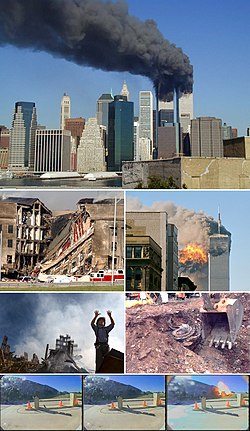 Newly released footage of the 9/11 incident suggest that the US government staged the attacks on New York to eliminate the threat of Saddam Hussein to Israel and take control of Iraqi oil, a political analyst tells Press TV.
Newly released footage of the 9/11 incident suggest that the US government staged the attacks on New York to eliminate the threat of Saddam Hussein to Israel and take control of Iraqi oil, a political analyst tells Press TV.
“Without any doubt anyone who takes a serious look at the physics, the engineering, the Aerodynamics of the situation realizes that virtually everything that the government told us about 9/11 is false,” he told Press TV in an interview.

 9/11 Glance
9/11 Glance Firefighters who worked at Ground Zero have a 19% greater chance of contracting cancer than those who did not, a landmark new medical study found.
Firefighters who worked at Ground Zero have a 19% greater chance of contracting cancer than those who did not, a landmark new medical study found. The number of Americans who say the government should do whatever it takes to protect its citizens against terrorism —even if it means violating civil liberties — has dropped almost in half since the days after the Sept. 11, 2001, attacks, according to a USA TODAY/Gallup Poll.
The number of Americans who say the government should do whatever it takes to protect its citizens against terrorism —even if it means violating civil liberties — has dropped almost in half since the days after the Sept. 11, 2001, attacks, according to a USA TODAY/Gallup Poll. Amid the chaos of the Sept. 11 attacks in 2001, emergency responders found they could not communicate with each other. That problem persists 10 years later, according to a review of the 9/11 Commission's recommendations.
Amid the chaos of the Sept. 11 attacks in 2001, emergency responders found they could not communicate with each other. That problem persists 10 years later, according to a review of the 9/11 Commission's recommendations. Thousands more Downtown residents may now receive compensation for their 9/11-related illnesses, after the federal government agreed to allow those who live as far north as Canal Street to apply.
Thousands more Downtown residents may now receive compensation for their 9/11-related illnesses, after the federal government agreed to allow those who live as far north as Canal Street to apply. Believing that the upcoming 10th anniversary of Sept. 11 is best memorialized in crayon, Really Big Coloring Books, Inc. is publishing a new coloring book entitled “We Shall Never Forget 9/11: The Kids’ Book of Freedom.”
Believing that the upcoming 10th anniversary of Sept. 11 is best memorialized in crayon, Really Big Coloring Books, Inc. is publishing a new coloring book entitled “We Shall Never Forget 9/11: The Kids’ Book of Freedom.” The National Geographic channel is trumpeting an exclusive interview with former President George W. Bush that is to be at the centerpiece of its coverage of the 10th anniversary of 9/11.
The National Geographic channel is trumpeting an exclusive interview with former President George W. Bush that is to be at the centerpiece of its coverage of the 10th anniversary of 9/11.






























